54 start with E start with E
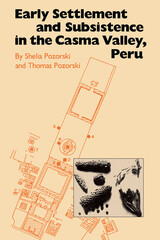
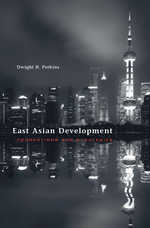
In the early 1960s, fewer than five percent of Japanese owned automobiles, China’s per capita income was among the lowest in Asia, and living standards in South Korea’s rural areas were on par with some of the world’s poorest countries. Today, these are three of the most powerful economies on earth. Dwight Perkins grapples with both the contemporary and historical causes and consequences of the turnaround, drawing on firsthand experience in the region to explain how Asian countries sustained such rapid economic growth in the second half of the twentieth century.
East Asian Development offers a comprehensive view of the region, from Japan and the “Asian Tigers” (Hong Kong, Singapore, Taiwan, South Korea) to Indonesia, Vietnam, Thailand, Malaysia, and China—a behemoth larger than all the other economies combined. While the overall picture of Asian growth is positive, no single economic policy has been effective regionwide. Interventionist policies that worked well in some countries failed elsewhere. Perkins analyzes income distribution, to uncover why initially egalitarian societies have ended up in very different places, with Japan, for example, maintaining a modest gap between rich and poor while China has become one of Asia’s most unequal economies.
Today, the once-dynamic Japanese and Korean economies are sluggish, and even China shows signs of losing steam. Perkins investigates whether this is a regional phenomenon or typical of all economies at this stage of development. His inquiry reminds us that the uncharted waters of China’s vast economy make predictions of its future performance speculative at best.
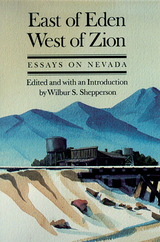
A collection of essays in which a dozen historians and novelists present their impressions and concerns about "end of the century Nevada." Human expectations and illusions are seen as a backdrop for today's Nevada as a new human frontier. As an overview of Nevada society, this study deals with culture as well as economics, with tradition as well as rapid population growth. The essayists inquire whether the friction between acquisition and preservation, quick wealth and refined sensitivity, will build a more humane and enlightened society.

This book charts the vicissitudes of a rural community of papermakers in Sichuan. The process of transforming bamboo into paper involves production-related and social skills, as well as the everyday skills that allowed these papermakers to survive in an era of tumultuous change. The Chinese revolution—understood as a series of interconnected political, social, and technological transformations—was, Jacob Eyferth argues, as much about the redistribution of skill, knowledge, and technical control as it was about the redistribution of land and political power.
The larger context for this study is the “rural–urban divide”: the institutional, social, and economic cleavages that separate rural people from urbanites. This book traces the changes in the distribution of knowledge that led to a massive transfer of technical control from villages to cities, from primary producers to managerial elites, and from women to men. It asks how a vision of rural people as unskilled has affected their place in the body politic and contributed to their disenfranchisement. By viewing skill as a contested resource, subject to distribution struggles, it addresses the issue of how revolution, state-making, and marketization have changed rural China.
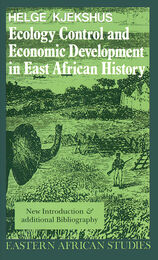
The book puts people at the centre of events. It thus serves as a modification to nationalist history with its emphasis on leaders. It presents environmental factors that had been underestimated; for instance, it points to the critical importance of the rinderpest outbreak.
Helge Kjekshus provides evidence to suggest that the nineteenth century was a period of relative prosperity with well-developed trade. He questions the view that warfare was pervasive and that the slave trade led to depopulation. He points to a balance between man and the environment.
This book is reissued at the same time as the first publication of Custodians of the Land: Ecology and Culture in the History of Tanzania edited by Gregory Maddox, James I. Giblin and Isaria N. Kimambo. The footnotes in that book point to the importance of the work of Helge Kjekshus.

This story of Kenya in the decade before the outbreak of the Mau Mau emergency presents an integrated view of imperial government as well as examining the social and economic causes of the Kikuyu revolt. Dr. Throup combines traditional Imperial History with its emphasis on the high politics of “The Official Mind” in the Colonial Office or in Government House with the new African historiography that concentrates on the people themselves.
Sir Philip Mitchell was the proconsul chosen to reassert metropolitan authority. Under Kenyatta’s leadership the Kenya African Union mobilized a popular constituency among the peasantry. In Nairobi the Kikuyu street gangs linked up with the militant Kikuyu trade unions, led by Fred Kubai and Bildad Kaggia, to challenge Kenyatta’s leadership.
The Mau Mau movement, as it was called by the government, was an alliance between three groups of discontented Kikuyu: the urban unemployed and destitute, the dispossessed squatters from the White Highlands and the tenants and members of the junior clans in the Kikuyu reserves.
The revolt was a dominating factor in convincing the conservative imperial government that the cost of repression in the African colonies was not worth the troops and resources.

Economic Analysis and Infrastructure Investment explores the links between infrastructure investment and economic outcomes, analyzing key economic issues in the funding and management of infrastructure projects. It includes new research on the short-run stimulus effects of infrastructure spending, develops new estimates of the stock of US infrastructure capital, and explores incentive aspects of public-private partnerships with particular attention to their allocation of risk. The volume provides a reference for researchers seeking to study infrastructure issues and for policymakers tasked with determining the appropriate level and allocation of infrastructure spending.
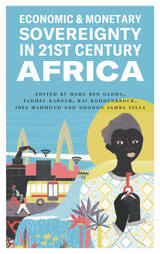
Over forty years after the formal end of colonialism, suffocating ties to Western financial systems continue to prevent African countries from achieving any meaningful monetary sovereignty.
Economic and Monetary Sovereignty in 21st Century Africa traces the recent history of African monetary and financial dependencies, looking at the ways African nations are resisting colonial legacies. Using a comparative, multi-disciplinary approach, this book uncovers what went wrong after the Pan-African approaches that defined the early stages of independence, and how most African economies fell into the firm grip of the IMF, World Bank, and the EU’s strict neoliberal policies.
This collection is the first to offer a wide-ranging, comparative and historical look at how African societies have attempted to increase their policy influence and move beyond neoliberal orthodoxy and US-dollar dependency. Economic and Monetary Sovereignty in 21st Century Africa is essential reading for anyone interested in the African quest for self-determination in a turbulent world of recurring economic and financial crises.



In the past fifty years, according to Christine So, the narratives of many popular Asian American books have been dominated by economic questions-what money can buy, how money is lost, how money is circulated, and what labor or objects are worth. Focusing on books that have achieved mainstream popularity, Economic Citizens unveils the logic of economic exchange that determined Asian Americans’ transnational migrations and national belonging.
With penetrating insight, So examines literary works that have been successful in the U.S. marketplace but have been read previously by critics largely as narratives of alienation or assimilation, including Fifth Chinese Daughter, Flower Drum Song, Falling Leaves and Turning Japanese. In contrast to other studies that have focused on the marginalization of Asian Americans, Economic Citizens examines how Asian Americans have entered into the public sphere.

In the 1970's, an “age of affluence” ended abruptly in Canada, Great Britain, and the United States. Skyrocketing inflation, persistent unemployment, and sluggish growth became new, oppressive realities for government and citizens alike. This book examines the changes that occurred in economic policymaking on the governmental level and the public's response to such changes. This timely collection of essays sheds light on the political economy of three of the world's oldest democracies in an era of economic distress and uncertainty.

For decades, Central America has faced market dependency, natural disasters, and political systems characterized by protectionist policies and low participation--situations that have had a tremendous impact on its economic development.
This two-volume set is a comprehensive assessment of Central America's position in the world economy, and it serves as a handbook for the important economic reforms Central America must undertake to become a viable competitor in the international economy.

For decades, Central America has faced market dependency, natural disasters, and political systems characterized by protectionist policies and low participation--situations that have had a tremendous impact on its economic development.
This two-volume set is a comprehensive assessment of Central America's position in the world economy, and it serves as a handbook for the important economic reforms Central America must undertake to become a viable competitor in the international economy.
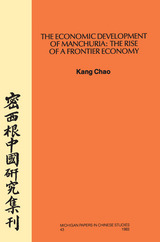

The most obvious effects will be on social programs such as public pension systems and the provision for medical needs of the elderly. But, the contributors demonstrate, aging will also affect markets for labor, capital, housing, and health care services. It will affect firms through their participation in the demand side of the labor market and through their provisions for pensions. And aging will influence saving rates, the rate of return on assets, the balance of payments, and, most likely, economic growth.
This volume will interest scholars and policy makers concerned with the economics of aging.
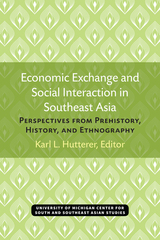
Yet in social science research in Southeast Asia, the area of economic studies has lagged behind, despite the great study potential represented by the tremendous diversity of its physical and human environment. Economic Exchange and Social Interaction in Southeast Asia attempts to take advantage of that opportunity. As a number of the contributions to this volume show, many if not most of the systems organized on very different levels of integration interact with each other. Taken as a whole, they provide evidence of the incredible diversity of economic and social systems that may be investigated in Southeast Asia.

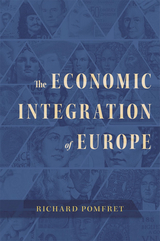
The clearest and most up-to-date account of the achievements—and setbacks—of the European Union since 1945.
Europe has been transformed since the Second World War. No longer a checkerboard of entirely sovereign states, the continent has become the largest single-market area in the world, with most of its members ceding certain economic and political powers to the central government of the European Union. This shift is the product of world-historical change, but the process is not well understood. The changes came in fits and starts. There was no single blueprint for reform; rather, the EU is the result of endless political turmoil and dazzling bureaucratic gymnastics. As Brexit demonstrates, there are occasional steps backward, too. Cutting through the complexity, Richard Pomfret presents a uniquely clear and comprehensive analysis of an incredible achievement in economic cooperation.
The Economic Integration of Europe follows all the major steps in the creation of the single market since the postwar establishment of the European Coal and Steel Community. Pomfret identifies four stages of development: the creation of a customs union, the deepening of economic union with the Single Market, the years of monetary union and eastward expansion, and, finally, problems of consolidation. Throughout, he details the economic benefits, costs, and controversies associated with each step in the evolution of the EU. What lies ahead? Pomfret concludes that, for all its problems, Europe has grown more prosperous from integration and is likely to increase its power on the global stage.
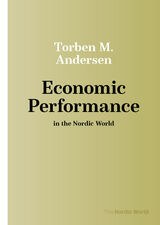
Economist Torben M. Andersen shows how the Nordic model rests on two pillars: the social safety net, which offers income compensation to the majority of those unable to support themselves, and the provision of services like education, childcare, and healthcare to all. The Nordic model can be characterized as one of employment, since its financial viability rests on a high labor participation rate with few working poor.
Andersen lays out the structure of the model and highlights factors important for understanding its economic performance. He then looks into specific policy areas based on Denmark's experiences regarding labor market policies (flexicurity), pension systems, and preparation for an aging population; and addresses the challenges arising from new technologies and globalization.

In the 1980s, world recession, drought, civil conflict, and other forces brought major economic upheaval to the countries of Sub-Saharan Africa. Most of the early efforts by governments to stabilize their economies met with little success, but The Gambia was an exception. In 1985 the government introduced the Economic Recovery Program, one of the most sweeping reform programs attempted on the continent. The economy quickly stabilized, with the rate of inflation falling to below ten percent and the overall balance of payments in surplus for the first time since the early 1970s.
Economic Recovery in The Gambia examines The Gambia's success in depth. It analyzes a wide range of policy reforms-exchange rates, taxation, foreign debt, agriculture, state-owned enterprises, customs inspection-and in each case, the authors review problems the government faced, steps that were taken to address them, and the success and failures of the reform initiatives. These economic and institutional analyses are complemented by an examination of the politics of reform and the role that donor agencies played. The final chapter summarizes important lessons from The Gambia's experience, and provides insights for other countries in Sub-Saharan Africa.
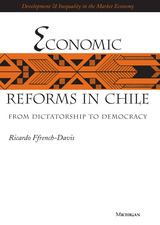
Written in accessible and readable prose, Economic Reforms in Chile begins with an overview of the Chilean economy during the last fifty years. This historical time frame is divided into three periods of economic reform. The first period covers the Pinochet regime, during which the more orthodox neoliberalism was implemented. The second period includes the Pinochet dictatorship, during which economic policy shifted toward pragmatism, particularly in the areas of trade and finance; it also includes the crisis of 1982 and its effects. The third period begins in 1990 with the return to democratic elections and the significant reforms to prior reforms. This section also examines the search for growth-with-equity, success in investment and growth performance, macroeconomic sustainability, and the reduction of poverty. Ffrench-Davis addresses several "paradoxes," or results that defy the expectations of policymakers, in order to analyze the significance of comprehensive macroeconomic equilibrium and its implications for sustainable stability, growth, and equity.
Economic Reforms in Chile will be of interest to economists, political scientists, and policymakers involved with the economies of emerging and developing countries.
Ricardo Ffrench-Davis is Principal Regional Advisor, ECLAC, Santiago, and Professor of Economics, University of Chile.

Charles Kindleberger, an international economic specialist, seeks in this book to show how economic history and economic analysis can interact, giving particular attention to the question of how history can be used in a comparative setting to test economic models for generality. His history and examples span the seventeenth to the twentieth century. The important and unexpected result is to show how the applicable economic model in given instances is strongly conditioned by social, socio-psychological, and political settings in which a given stimulus elicits a particular response. As a by-product, Kindleberger throws light on the political economy of Western European states, especially in international economic dimensions, but also in technological change, scientific education, and economic growth.
In these spirited and lucid essays, Kindleberger discusses related and abiding economic questions: whether the creation of a world financial center is inevitable; what the possible bases for free trade are; how insights can be gained into present day multinational corporations; and how information networks can maximize benefits in trade, and can affect the quality of output, costs, and economies of scale.
Part of the author's interest is methodological. He believes that the comparative method—studying the same rather restricted problem in comparable economies in a fixed regional and temporal setting—yields richer insights than those available from the history of the single economy. While his own studies are limited to merchants, tariffs, free trade, capital markets, and ports, a methodological introductory chapter discusses a wider range of applications.
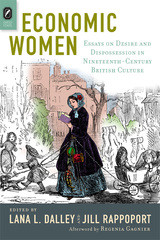
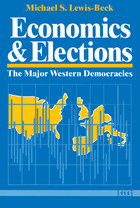
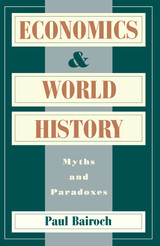
"A challenging and readable introduction to some major controversial themes in modern international economic history."—Peter J. Cain, International History Review
"Paul Bairoch sheds fascinating light on many of the accepted truths of modern economic history: an intriguing account, well executed."—Alfred L. Malabre, Jr., Economics Editor, Wall Street Journal

The Economics of Aging presents results from an ongoing National Bureau of Economic Research project. Contributors consider the housing mobility and living arrangements of the elderly, their labor force participation and retirement, the economics of their health care, and their financial status. The goal of the research is to further our understanding both of the factors that determine the well-being of the elderly and of the consequences that follow from an increasingly older population with longer individual life spans. Each paper is accompanied by critical commentary.
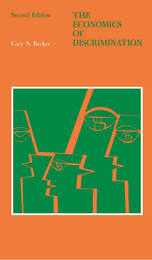
Mr. Becker's work confronts the economic effects of discrimination in the market place because of race, religion, sex, color, social class, personality, or other non-pecuniary considerations. He demonstrates that discrimination in the market place by any group reduces their own real incomes as well as those of the minority.
The original edition of The Economics of Discrimination was warmly received by economists, sociologists, and psychologists alike for focusing the discerning eye of economic analysis upon a vital social problem—discrimination in the market place.
"This is an unusual book; not only is it filled with ingenious theorizing but the implications of the theory are boldly confronted with facts. . . . The intimate relation of the theory and observation has resulted in a book of great vitality on a subject whose interest and importance are obvious."—M.W. Reder, American Economic Review
"The author's solution to the problem of measuring the motive behind actual discrimination is something of a tour de force. . . . Sociologists in the field of race relations will wish to read this book."—Karl Schuessler, American Sociological Review
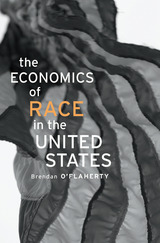
Brendan O’Flaherty brings the tools of economic analysis—incentives, equilibrium, optimization, and more—to bear on contentious issues of race in the United States. In areas ranging from quality of health care and education, to employment opportunities and housing, to levels of wealth and crime, he shows how racial differences among blacks, whites, Hispanics, and Asian Americans remain a powerful determinant in the lives of twenty-first-century Americans. More capacious than standard texts, The Economics of Race in the United States discusses important aspects of history and culture and explores race as a social and biological construct to make a compelling argument for why race must play a major role in economic and public policy. People are not color-blind, and so policies cannot be color-blind either.
Because his book addresses many topics, not just a single area such as labor or housing, surprising threads of connection emerge in the course of O’Flaherty’s analysis. For example, eliminating discrimination in the workplace will not equalize earnings as long as educational achievement varies by race—and educational achievement will vary by race as long as housing and marriage markets vary by race. No single engine of racial equality in one area of social and economic life is strong enough to pull the entire train by itself. Progress in one place is often constrained by diminishing marginal returns in another. Good policies can make a difference, and only careful analysis can figure out which policies those are.
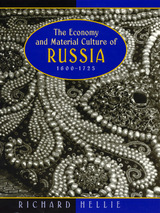
Impressive in scope and data analysis, Economy and Material Culture of Russia, 1600-1725 will be an invaluable resource and reference work for all readers interested in economic history and the history of material culture. Since there is no comparable one-volume work for any other society at any other time in history, Hellie's is a truly unique and profound achievement.


The authors present the first detailed economic analysis of the Palestinian uprising, showing how the unrest has led to a fall in Arab employment in Israel and serious economic loss to the occupied territories with some loss to Israel. They also examine how the uprising has affected Israel's financial standing internationally and the inflow of foreign aid.
Razin and Sadka see promise for Israel's economy in the waves of immigration from the former Soviet Union, despite the current difficulties in absorbing the immigrants; in the coexistence of a flourishing and highly competitive private sector with a relatively large public sector, which is undergoing privatization; and in a tax structure that encourages long-term saving and business growth. By examining the interplay between the exchange rate, interest rates, and monetary and anti-inflation policies, the authors investigate the possibilities for renewed growth and conclude that the future of Israel's economy crucially depends on serious efforts to secure peace in the Middle East.
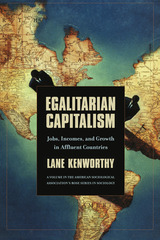

The Illinois frontier offered abundant opportunity, noted English traveler William Oliver after his journey to America in 1841–42, but life there was hard. Accordingly, Oliver advised the wealthy and comfortable to remain in England and counseled the unprosperous to seek their fortunes in America. Written for the poor who would migrate and published in 1843, his Eight Months in Illinois: With Information to Immigrants sought only to provide pertinent, valid, and practical information about what people might encounter in the frontier state. What Oliver actually accomplished, however, was much more: he imparted invaluable insights into and analyses of American life during an era of sweeping social, economic, and political change.
In his new foreword to this edition, James E. Davis stresses Oliver’s sincere desire to help British immigrants succeed in America. Oliver, Davis notes, “devoted dozens of pages of advice on numerous matters: various routes to Illinois and their advantages and disadvantages, processes of settling, qualities of western houses, costs of obtaining a new farm.” Oliver discussed other practical matters, such as the importance of having sons. He also assured his intended readership that “in the West, distinction of classes is little known and seldom recognized.”
As a document covering the middle west in the 1840s, Eight Months in Illinois: With Information to Immigrants has few equals. Its portrayal of farming and trade in relatively primitive times is historically accurate. It paints a plain picture, laying out the essential facts and presenting the typical incidents that enable us to trace the course of a settler’s simple, diligent, laborious day-to-day life. According to Davis, Oliver depicted “accurate and balanced slices of life in Illinois and America, including nasty insects, crude conditions, and the necessity of work.” And he did so without a trace of anti-American bias.
Eight Months in Illinois with Information to Immigrants was reprinted with emendations in 1924 by Walter Hill.
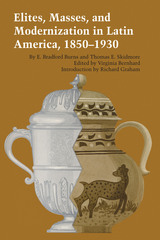
The interactions between the elites and the lower classes of Latin America are explored from the divergent perspectives of three eminent historians in this volume. The result is a counterbalance of viewpoints on the urban and the rural, the rich and the poor, and the Europeanized and the traditional of Latin America during the late nineteenth and early twentieth centuries.
E. Bradford Burns advances the view that two cultures were in conflict in nineteenth-century Latin America: that of the modernizing, European-oriented elite, and that of the “common folk” of mixed racial background who lived close to the earth. Thomas E. Skidmore discusses the emerging field of labor history in twentieth-century Latin America, suggesting that the historical roots of today’s exacerbated tensions lie in the secular struggle of army against workers that he describes. In the introduction, Richard Graham takes issue with both authors on certain basic premises and points out implications of their essays for the understanding of North American as well as Latin American history.
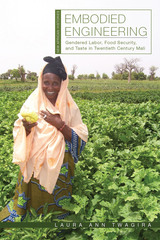
Foregrounding African women’s ingenuity and labor, this pioneering case study shows how women in rural Mali have used technology to ensure food security through the colonial period, environmental crises, and postcolonial rule.
By advocating for an understanding of rural Malian women as engineers, Laura Ann Twagira rejects the persistent image of African women as subjects without technological knowledge or access and instead reveals a hidden history about gender, development, and improvisation. In so doing, she also significantly expands the scope of African science and technology studies.
Using the Office du Niger agricultural project as a case study, Twagira argues that women used modest technologies (such as a mortar and pestle or metal pots) and organized female labor to create, maintain, and reengineer a complex and highly adaptive food production system. While women often incorporated labor-saving technologies into their work routines, they did not view their own physical labor as the problem it is so often framed to be in development narratives. Rather, women’s embodied techniques and knowledge were central to their ability to transform a development project centered on export production into an environmental resource that addressed local taste and consumption needs.

China is emerging as a truly global economic and political power. China’s impact on Latin America and the Caribbean region is mixed, however—fostering a trade market for some countries, but creating competition for others.
This pioneering volume, produced by the Inter-American Development Bank’s Integration and Regional Programs Department and Research Department, provides a comprehensive overview of China’s economic policy and performance over recent decades and contrasts them with the Latin American experience. What are the underlying factors behind China’s competitive edge? What are the strategic implications of China’s rise for growth and development in Latin America? These questions open new avenues for thinking about revitalizing development strategies in Latin America in the face of China’s successful development and reduction of poverty. This insightful report is a must-read for analysts, policymakers, and development practitioners, not only in Latin America and the Caribbean, but wherever China’s presence is being felt.
The Emergence of China is a copublication of the David Rockefeller Center for Latin American Studies and the Inter-American Development Bank.

Leading writer Boris Kagarlitsky offers an ambitious account of 1000 years of Russian history. Encompassing all key periods in Russia's dramatic development, the book covers everything from early settlers, through medieval decline, Ivan the Terrible - the 'English Tsar', Peter the Great, the Crimean War and the rise of capitalism, the revolution, the Soviet period, finally ending with the return of capitalism after 1991.
Setting Russia within the context of the 'World System', as outlined by Wallerstein, this is a major work of historical Marxist theory that is set to become a future classic.

This history of administrative thought and practice in colonial Kenya looks at the ways in which white people tried to engineer social change.
It asks four questions:
- Why was Kenya’s welfare operation so idiosyncratic and spartan compared with that of other British colonies?
- Why did a transformation from social welfare to community development produce further neglect of the very poor?
- Why was there no equivalent to the French tradition of community medicine?
- If there was a transformatory element of colonial rule that sought to address poverty, where and why did it fall down?
The answers offer revealing insight into the dynamics of rule in the late colonial period in Kenya.


Named by the Times Literary Supplement as one of the 100 most influential books since the end of World War II, The End of Ideology has been a landmark in American social thought, regarded as a classic since its first publication in 1962.
Daniel Bell postulated that the older humanistic ideologies derived from the nineteenth and early twentieth centuries were exhausted, and that new parochial ideologies would arise. In a new introduction to the year 2000 edition, he argues that with the end of communism, we are seeing a resumption of history, a lifting of the heavy ideological blanket and the return of traditional ethnic and religious conflicts in the many regions of the former socialist states and elsewhere.

Since the Founding, Americans have debated the true meaning of freedom. For some, freedom meant the provision of life’s necessities, those basic conditions for the “pursuit of happiness.” For others, freedom meant the civil and political rights enumerated in the Bill of Rights and unfettered access to the marketplace—nothing more. As Mark Paul explains, the latter interpretation—thanks in large part to a particularly influential cadre of economists—has all but won out among policymakers, with dire repercussions for American society: rampant inequality, endemic poverty, and an economy built to benefit the few at the expense of the many.
In this book, Paul shows how economic rights—rights to necessities like housing, employment, and health care—have been a part of the American conversation since the Revolutionary War and were a cornerstone of both the New Deal and the Civil Rights Movement. Their recuperation, he argues, would at long last make good on the promise of America’s founding documents. By drawing on FDR’s proposed Economic Bill of Rights, Paul outlines a comprehensive policy program to achieve a more capacious and enduring version of American freedom. Among the rights he enumerates are the right to a good job, the right to an education, the right to banking and financial services, and the right to a healthy environment.
Replete with discussions of some of today’s most influential policy ideas—from Medicare for All to a federal job guarantee to the Green New Deal—The Ends of Freedom is a timely and urgent call to reclaim the idea of freedom from its captors on the political right—to ground America’s next era in the country’s progressive history and carve a path toward a more economically dynamic and equitable nation.
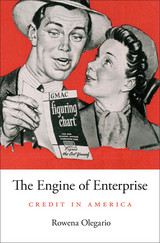
American households, businesses, and governments have always used intensive amounts of credit. The Engine of Enterprise traces the story of credit from colonial times to the present, highlighting its productive role in building national prosperity. Rowena Olegario probes enduring questions that have divided Americans: Who should have access to credit? How should creditors assess borrowers’ creditworthiness? How can people accommodate to, rather than just eliminate, the risks of a credit-dependent economy?
In the 1790s Alexander Hamilton saw credit as “the invigorating principle” that would spur the growth of America’s young economy. His great rival, Thomas Jefferson, deemed it a grave risk, inviting burdens of debt that would amount to national self-enslavement. Even today, credit lies at the heart of longstanding debates about opportunity, democracy, individual responsibility, and government’s reach.
Olegario goes beyond these timeless debates to explain how the institutions and legal frameworks of borrowing and lending evolved and how attitudes about credit both reflected and drove those changes. Properly managed, credit promised to be a powerful tool. Mismanaged, it augured disaster. The Engine of Enterprise demonstrates how this tension led to the creation of bankruptcy laws, credit-reporting agencies, and insurance regimes to harness the power of credit while minimizing its destabilizing effects.

New England's economy has a history as dramatic as any in the world. From an inauspicious beginning--as immigration ground to a halt in the eighteenth century--New England went on to lead the United States in its transformation from an agrarian to an industrial economy. And when the rest of the country caught up in the mid-twentieth century, New England reinvented itself as a leader in the complex economy of the information society.
Engines of Enterprise tells this dramatic story in a sequence of narrative essays written by preeminent historians and economists. These essays chart the changing fortunes of entrepreneurs and venturers, businessmen and inventors, and common folk toiling in fields, in factories, and in air-conditioned offices. The authors describe how, short of staple crops, colonial New Englanders turned to the sea and built an empire; and how the region became the earliest home of the textile industry as commercial fortunes underwrote new industries in the nineteenth century. They show us the region as it grew ahead of the rest of the country and as the rest of the United States caught up. And they trace the transformation of New England's products and exports from cotton textiles and machine tools to such intangible goods as education and software. Concluding short essays also put forward surprising but persuasive arguments--for instance, that slavery, while not prominent in colonial New England, was a critical part of the economy; and that the federal government played a crucial role in the development of the region's industrial skills.
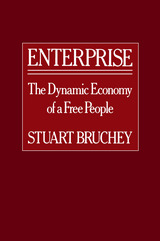
Not since Charles and Mary Beard's The Rise of American Civilization has a narrative been written for the general reader and student alike that so superbly explicates the origins of American capitalism. Arguing that the central fact explaining the success of the American experiment is the development of the economy, the distinguished economic historian Stuart Bruchey shows the reciprocal relationship between economic growth and values, law, and social and political change, as well as between economic development and the more traditional variables of capital, labor, and resources.
Enterprising, risk-taking men and women in all walks of life are at the center of the remarkable story that is the American dream and reality. The farm family moving to an unfamiliar environment and trying new technology; the business executive or worker with a new idea for improving a machine; the jurist venturing down a different legal path to sharpen incentives to invest; lawmakers of all kinds risking tenure or office by giving priority to measures designed to entice capital and labor to their jurisdictions—these entrepreneurs provided the leaven that gradually raised the living standards of the average person to heights unknown anywhere in the past.
Twenty years in the writing, Enterprise summarizes the scholarly contributions of historians and social scientists. It reaches deep into the European past—to fourteenth-century Italy—to retrace the origins of American capitalism. The author tells the story of individual achievement and vertical social mobility and their triumph over obstacles, a never-ending theme of American enterprise. Whether Americans maintain those heights today or will suffer a decline as the price of 1980s “now-nowism”—as Richard Darman characterizes this decade of wanting everything, at once, and paying nothing—remains to be seen.
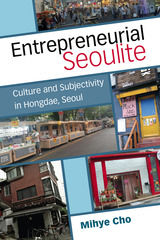
Recent research on Korean culture approaches the K-wave phenomenon from the perspectives of cultural consumption, media analysis, and cultural management and policy. Meanwhile, studies on Seoul have centered on its transformation as a global, creative city. Rather than examining the K-wave or the city itself, this book explores the experience of living through the city-in-transition, focusing on the relationship between “the ideology that justified engagement in capitalism” and the “subjectification process.” The book aims to understand the project to institutionalize a cultural district in Hongdae as a demonstration of the coevolution of ideologies and citizenship in a society undergoing rapid liberalization—politically, culturally, and economically.
A cultural turn took place in Korea during the 1990s, amid the economic prosperity driven by state-led industrialization and the collapse of the military dictatorship due to democratization movements. Cultural critiques, emerging as an alternative to social movements, proliferated to assert the freedom and autonomy of individuals against regulatory systems and institutions. The nation was hit by the Asian financial crisis in 1997, and witnessed massive economic restructuring including layoffs, stakeouts, and a prevalence of contingent employment. As a result, the entire nation had to find new engines of economic growth while experiencing a creative destruction. At the center of this national transformation, Seoul has sought to recreate itself from a mega city to a global city, equipped with cutting-edge knowledge industries and infrastructures.
By juxtaposing the cultural turn and cultural/creative city-making, Entrepreneurial Seoulite interrogates the formation of new citizen subjectivity, namely the enterprising self, in post-Fordist Seoul. What kinds of logic guide individuals in the engagement of new urban realities in rapidly liberalized Seoul—culturally and economically? In order to explore this query, Mihye Cho draws on Weber’s concept of “the spirit of capitalism” on the formation of a new economic agency focusing on the re-configuration of meanings, and seeks to capture a transformative moment detailing when and how capitalism requests a different spirit and lifestyle of its participants. Likewise, this book approaches the enterprising self as the new spirit of post-Fordist Seoul and explores the ways in which people in Seoul internalize and negotiate this new enterprising self.

Malaysia interests development practitioners for many reasons, not least because of its remarkably rich natural environment. Environment and Development in a Resource-Rich Economy provides an invaluable analysis of major natural resource and environmental policy issues in the country during the 1970s and 1980s--a period of profound socioeconomic changes, rapid depletion of natural resources, and the emergence of serious air and water pollution problems.
What is path-breaking about this book is its emphasis on economics as a source of concepts and methods for analyzing natural resource and environmental issues and policy responses. The authors' access to unpublished data and key decision makers makes this account of extensive, field-based research an essential reference for policy makers and researchers concerned about environmental and natural resource management--both in Malaysia and throughout the globe. The book should be of particular interest for students who hope to understand more thoroughly the economic underpinnings of natural resource and environmental management policy.

This first detailed study of the bishops of Florence tells the story of a dynamic Italian lordship during the most prosperous period of the Middle Ages. Drawing upon a rich base of primary sources, George Dameron demonstrates that the nature of the Florentine episcopal lordship results from the tension between seigneurial pressure and peasant resistance. Implicit throughout is the assumption that episcopal lordship relied upon both the bishop’s jurisdictional power and his spiritual or sacramental power.
The story of the Florentine bishops illuminates important moments in Italian history. The development of the Florentine elite, for example, is closely tied to the political and economic privileges they derived from their access to ecclesiastical property. A study of the bishopric’s vast holdings in the major river valleys surrounding Florence also provides valuable insight into the nature of the interrelation between city and countryside. Comparisons with lordships in other Italian cities contrast with and define the nature of medieval lordship.
This economic, social, and political history addresses issues of concern to a wide audience of historians: the emergence of the commune, the social development of the nobility, the nature of economic change before the Black Death, and the transition from feudalism to capitalism.

Bringing together the work of outstanding scholars in Andean history, anthropology, and ethnohistory, these pioneering essays show how, from the very earliest period of Spanish rule, Andean peasants and their rulers embraced the new economic opportunities and challenged or subverted the new structures introduced by the colonial administration. They also convincingly explain why in the twentieth century the mistaken idea developed that Andean peasants were conservative and unable to participate effectively in different markets, and reveal how closely ethnic inequalities were tied to evolving market relations. Inviting a critical reconsideration of ethnic, class, and gender issues in the context of rural Andean markets, this book will revise the prevailing view of Andean history and provide a more fully informed picture of the complex mercantile activities of Andean peasants.
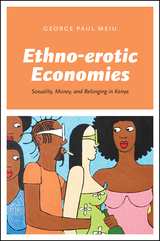
George Paul Meiu uses his deep familiarity with the communities these men come from to explore the long-term effects of markets of ethnic culture and sexuality on a wide range of aspects of life in rural Kenya, including kinship, ritual, gender, intimate affection, and conceptions of aging. What happens to these communities when young men return with such surprising wealth? And how do they use it to improve their social standing locally? By answering these questions, Ethno-erotic Economies offers a complex look at how intimacy and ethnicity come together to shape the pathways of global and local trade in the postcolonial world.
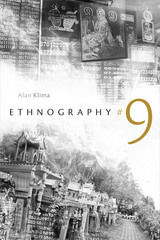

When she was only nine, Dayani Baldelomar left her Nicaraguan village with nothing more than a change of clothes. She was among tens of thousands of rural migrants to Managua in the 1980s and 1990s. After years of homelessness, Dayani landed in a shantytown called The Widows, squeezed between a drainage ditch and putrid Lake Managua. Her neighbor, Yadira Castellón, also migrated from the mountains. Driven by hope for a better future for their children, Dayani, Yadira, and their husbands invent jobs in Managua’s spreading markets and dumps, joining the planet’s burgeoning informal economy. But a swelling tide of family crises and environmental calamities threaten to break their toehold in the city.
Dayani’s and Yadira’s struggles reveal one of the world’s biggest challenges: by 2050, almost one-third of all people will likely live in slums without basic services, vulnerable to disasters caused by the convergence of climate change and breakneck urbanization. To tell their stories, Douglas Haynes followed Dayani’s and Yadira’s families for five years, learning firsthand how their lives in the city are a tightrope walk between new opportunities and chronic insecurity. Every Day We Live Is the Future is a gripping, unforgettable account of two women’s herculean efforts to persevere and educate their children. It sounds a powerful call for understanding the growing risks to new urbanites, how to help them prosper, and why their lives matter for us all.
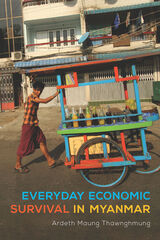
Thawnghmung conducted in-depth interviews and surveys of 372 individuals from all walks of life and across geographical locations in Myanmar between 2008 and 2015. To frame her analysis, she provides context from countries with comparable political and economic situations. Her findings will be welcomed by political scientists and policy analysts, as well by journalists and humanitarian activists looking for substantive, reliable information about everyday life in a country that remains largely in the shadows.
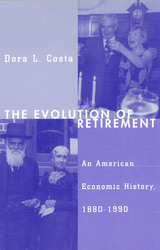
"[Costa's] major contribution is to show that, even without Social Security and Medicare, retirement would have expanded dramatically."—Robert J. Samuelson, New Republic
"An important book on a topic which has become popular with historians and is of major significance to politicians and economists."—Margaret Walsh, Business History
READERS
Browse our collection.
PUBLISHERS
See BiblioVault's publisher services.
STUDENT SERVICES
Files for college accessibility offices.
UChicago Accessibility Resources
home | accessibility | search | about | contact us
BiblioVault ® 2001 - 2024
The University of Chicago Press









